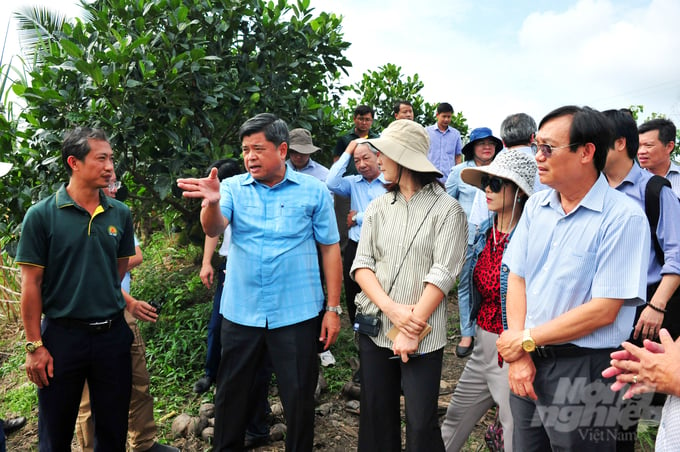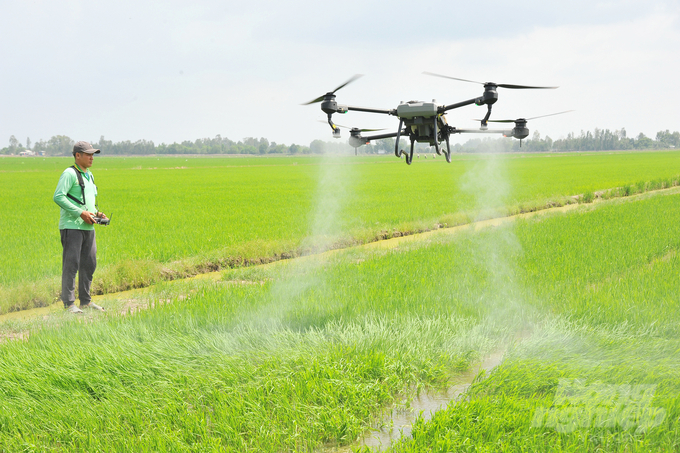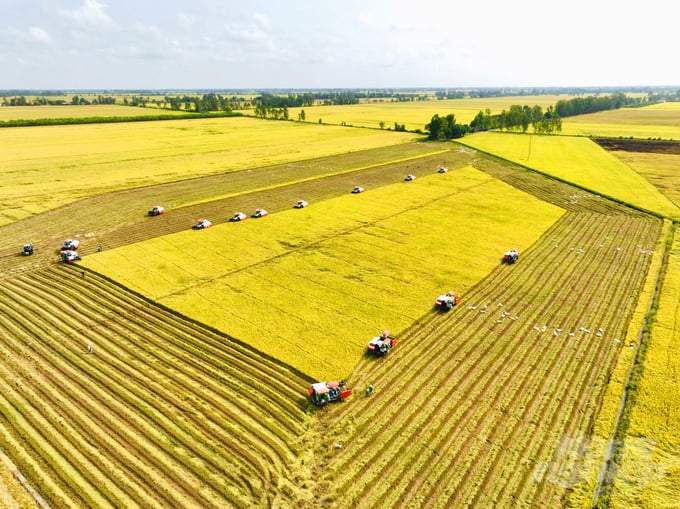June 20, 2025 | 03:54 GMT +7
June 20, 2025 | 03:54 GMT +7
Hotline: 0913.378.918
June 20, 2025 | 03:54 GMT +7
Hotline: 0913.378.918

Deputy Minister of Agriculture and Rural Development, Tran Thanh Nam, visits the 1 million-hectare high-quality rice field in Tri Ton District, An Giang. Photo: Le Hoang Vu.
In the face of climate change and the growing demand for sustainable agricultural development, building effective rice supply chains has become a crucial step towards enhancing production efficiency and increasing the value of agricultural products.
In An Giang province, the initiative "Developing 1 million hectares of high-quality, low-emission rice linked with green growth in the Mekong Delta by 2030" has opened up numerous opportunities for economic development for local farmers, cooperatives, and businesses. This project aims to foster the creation of a comprehensive rice supply chain that connects every stage from production to consumption, ultimately contributing to improving the quality of rice while minimizing carbon emissions in the process.
According to Mr. Nguyen Si Lam, Director of An Giang’s Department of Agriculture and Rural Development, the project is not only a key driver for boosting the export value of rice but also provides a significant opportunity for the province to accelerate agricultural development that is aligned with green growth principles. Over the past period, the agricultural sector in An Giang has made significant efforts to develop large-scale high-quality rice farming models, with a strong emphasis on minimizing carbon emissions through sustainable and environmentally-friendly production methods. Farmers and cooperatives in the region have gradually adopted advanced agricultural techniques, incorporating ecological farming technologies while also reducing the use of chemicals.
“Engaging in the supply chain is a critical factor that provides farmers with reassurance about the market for their products, ensuring they have a stable and reliable income”, emphasized Mr. Lam. “At the same time, businesses also benefit from a steady supply of high-quality raw materials that meet export standards. As a result, both farmers and businesses stand to gain, and together, they make significant contributions to the province’s overall goal of sustainable development. Moreover, this model positions An Giang to lead the way in reducing greenhouse gas emissions in agricultural production, safeguarding the environment, and addressing the challenges posed by climate change”, he further stressed.
Throughout the implementation process, the districts and cooperatives in An Giang have made significant strides and achieved positive outcomes. According to reports from the Department of Agriculture and Rural Development in various districts, participation in the project has provided clear and tangible benefits to local communities. Notably, cooperatives have played a pivotal role in connecting farmers with businesses, facilitating the formation of large-scale production models that help reduce operational costs and enhance profitability.
In the case of some of the pioneering cooperatives that have joined the project, the adoption of high-quality production standards has led to noticeable improvements in rice productivity. Additionally, these practices have helped to significantly reduce the environmental impact of farming activities.

An Giang has made efforts to develop large-scale high-quality rice models, aiming to reduce carbon emissions through sustainable production processes. Photo: Le Hoang Vu.
Mr. Nguyen Thanh Vu, Director of Son Hoa Agricultural Cooperative (Vong Dong Commune, Thoai Son District), shared: "By participating in this value chain, we have received comprehensive support, ranging from technical guidance and quality seeds to safe production processes. This has significantly improved the quality of our rice. More importantly, through production agreements with businesses, farmers no longer have to worry about finding buyers for their produce. The price of rice is also more stable and, in many cases, higher than it was before".
Furthermore, businesses have played an active role in this value chain. Through the establishment of purchasing contracts, they not only ensure that farmers can focus on production but also supply the market with high-quality rice. This mutually beneficial relationship has contributed to enhancing the reputation of An Giang’s rice industry, opening up numerous opportunities for export.
In the coming years, particularly by 2025, An Giang is set to significantly advance the implementation of solutions for the project “Development of 1 million hectares of high-quality, low-emission rice”. According to Mr. Nguyen Si Lam, the Director of the Department of Agriculture and Rural Development (DARD), the focus will be on scaling up production and improving the quality of rice varieties. Local authorities will also prioritize the application of ecological farming technologies and further promote environmentally-friendly agricultural practices to reduce greenhouse gas emissions.
Additionally, the province plans to continue building and strengthening comprehensive value chains that connect production with the market. DARD will work closely with businesses and cooperatives to ensure that farmers not only have secure and consistent market access but also receive fair and competitive pricing for their products. The local government will also encourage cooperatives and farmers to invest in modern production infrastructure, integrate high-tech solutions into their farming practices, and participate in various training programs aimed at improving both their production skills and management capabilities.

One of An Giang's key goals for 2025 is to expand the area of high-quality rice cultivation, thereby enabling more farmers to participate in the program. Photo: Le Hoang Vu.
One of the major goals for An Giang in 2025 is to significantly expand the area dedicated to cultivating high-quality rice, which will provide more opportunities for local farmers to join this value chain. An Giang also plans to intensify its efforts in fostering international cooperation, with the aim of learning from global best practices, gaining valuable insights and attracting foreign investment. This will, in turn, contribute to driving the sustainable development of the rice industry.
The project "Development of 1 million hectares of high-quality, low-emission rice linked to green growth in the Mekong Delta by 2030" is being progressively implemented in An Giang and has already brought about many positive outcomes. With the dedicated efforts of the Department of Agriculture and Rural Development, local districts, cooperatives and businesses, the rice value chain is becoming stronger and more integrated, providing farmers with the confidence to continue their production activities while also enhancing the overall value of agricultural products.
Looking ahead, with a clear set of goals and strategic development plans, An Giang hopes to become one of the leading provinces in the production of high-quality, low-emission rice. The province aims to play a key role in promoting sustainable agricultural practices, aligning with the broader objectives of environmental protection and economic growth. This will play a key role in advancing the sustainable growth of the province's agricultural industry.
Translated by Phuong Linh
/2025/06/17/3942-2-143243_548.jpg)
(VAN) Recently, in Sweden, the Secretary of the Binh Dinh Provincial Party Committee presented the Investment Registration Certificate for the 'Polyester Fabric Recycling Complex' project to SYRE Impact-AB Company.
/2025/06/12/3721-2-202745_83.jpg)
(VAN) TH made an impression at Seoul Food 2025 with its line of natural beverages, paving the way for Vietnamese food products to enter the South Korean market.

(VAN) Soc Trang's success in rice exports stems from a strategy of developing fragrant and specialty rice cultivation areas and standardizing production toward low-emission practices.
/2025/06/11/1311-5-120811_839.jpg)
(VAN) The pig farming industry is facing the challenge of comprehensive restructuring to meet requirements for quality, safety, traceability, and market expansion both domestically and for export.

(VAN) Vietnam considers participating in ALGROALBA in order to expand agricultural production, coordinate the assessment and effective exploitation potential land.
/2025/06/05/5314-1-184727_407.jpg)
(VAN) From seemingly worthless fish scales and skin, enzymes and lactic ferments can transform by-products into peptides, opening a sustainable, effective business direction and elevating Vietnamese seafood.

(VAN) TTC AgriS and IFC signed a strategic partnership to develop a sustainable agricultural value chain, aiming to achieve the Net Zero target by 2035.